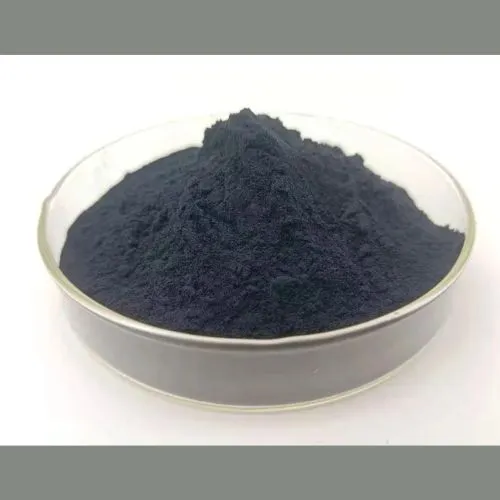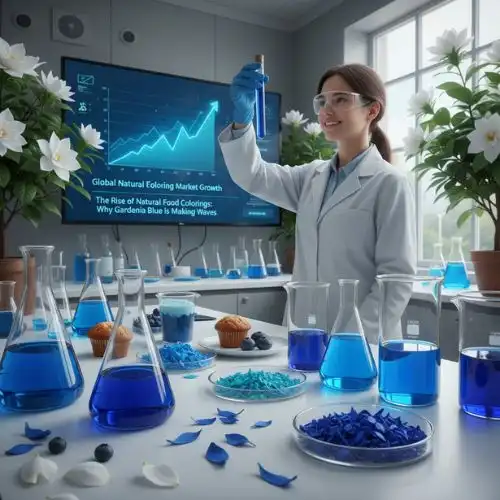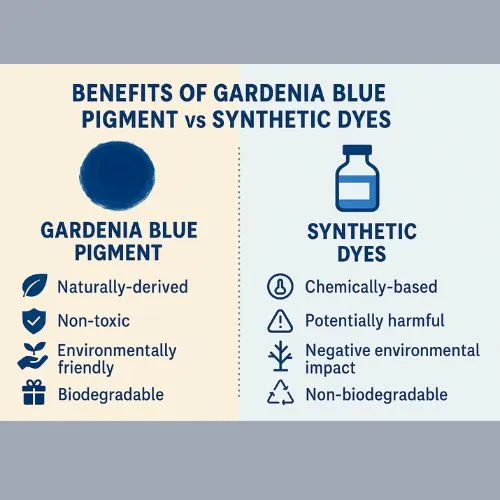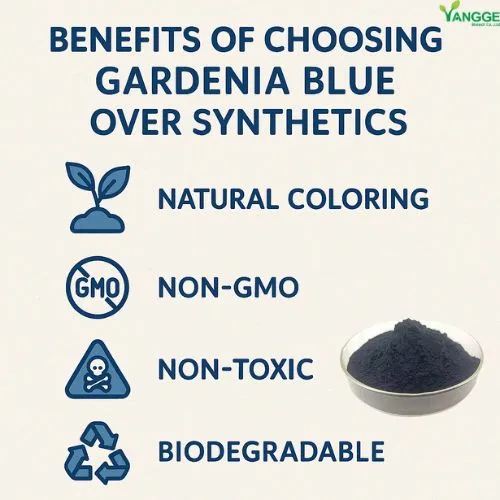Nutritionists Recommend Gardenia Blue for Natural Food Coloring
In recent years, there has been a growing trend towards natural and plant-based ingredients in the food industry. One such ingredient that has caught the attention of nutritionists and food manufacturers alike is Gardenia Blue Pigment. This natural food coloring, derived from the fruits of the Gardenia jasminoides plant, offers a vibrant blue hue without the need for artificial additives. Let's explore why nutritionists are recommending Gardenia Blue for natural food coloring and its numerous benefits in the culinary world.

The Rise of Natural Food Colorings: Why Gardenia Blue is Making Waves?
Understanding the Shift Towards Natural Ingredients
Consumer preferences have been shifting dramatically in recent years, with an increasing demand for clean label products and natural ingredients. This trend has put pressure on food manufacturers to find alternatives to synthetic food colorings, which have been associated with various health concerns. Enter Gardenia Blue Pigment, a natural solution that addresses these concerns while providing an appealing blue color to food and beverages.
Nutritionists have been at the forefront of advocating for natural food colorings, recognizing the potential health benefits of moving away from artificial additives. Gardenia Blue, extracted from the fruits of the Gardenia jasminoides plant, offers a plant-based alternative that aligns with these health-conscious recommendations.
The Unique Properties of Gardenia Blue Pigment
Gardenia Blue Pigment, also known as Gardenia Blue Powder Extract, possesses several unique properties that make it an attractive option for food coloring. Its main components are crocin and crocin of carotene, which contribute to its intense blue hue. The pigment is easily soluble in water and ethanol aqueous solutions, making it versatile for various food applications.
One of the most notable features of Gardenia Blue is its stability across a wide pH range. Unlike some natural colorants that are sensitive to pH changes, Gardenia Blue maintains its color tone and stability between pH 4 and 8. This characteristic makes it suitable for a diverse range of food products, from acidic beverages to neutral baked goods.
Environmental and Ethical Considerations
Beyond its functional properties, Gardenia Blue aligns with environmentally conscious and ethical consumption trends. As a plant-based product, it has a lower environmental impact compared to synthetic dyes derived from petrochemicals. Additionally, the use of Gardenia Blue supports sustainable agriculture practices, as Gardenia jasminoides is a renewable resource that can be cultivated without significant environmental degradation.
Nutritionists often emphasize the importance of choosing food ingredients that not only benefit individual health but also contribute to the overall well-being of the planet. In this regard, Gardenia Blue stands out as a responsible choice for food coloring.

Health Benefits and Safety Profile of Gardenia Blue in Food Applications
Nutritional Advantages of Gardenia Blue
While Gardenia Blue is primarily used for its coloring properties, nutritionists have noted that it may offer additional health benefits. The pigment contains antioxidants, which are compounds known for their potential to reduce oxidative stress in the body. Antioxidants have been linked to various health benefits, including improved heart health and reduced risk of certain chronic diseases.
Moreover, Gardenia Blue is derived from a fruit that has been used in traditional medicine for centuries. In Chinese medicine, Gardenia fruit, known as "Zhi Zi," has been utilized for its potential anti-inflammatory and neuroprotective properties. While more research is needed to fully understand these effects in the context of food coloring, the historical use of Gardenia in herbal medicine adds to its appeal as a natural ingredient.
Safety Profile and Regulatory Status
One of the primary reasons nutritionists recommend Gardenia Blue is its favorable safety profile. Unlike some synthetic food dyes that have been associated with adverse health effects, Gardenia Blue has not been linked to significant health concerns when used as directed in food applications.
The safety of Gardenia Blue is further supported by its regulatory status. In many countries, including the United States and European Union, Gardenia Blue is approved for use as a food coloring agent. This approval comes after rigorous safety assessments by regulatory bodies, providing assurance to both food manufacturers and consumers.
Allergen Considerations and Dietary Restrictions
For individuals with dietary restrictions or allergies, Gardenia Blue offers several advantages. It is naturally free from common allergens such as gluten, soy, and dairy. This makes it a suitable option for individuals with food sensitivities or those following special diets.
Additionally, Gardenia Blue is compatible with vegan and vegetarian diets, as it is entirely plant-based. This aligns with the recommendations of many nutritionists who advocate for increased consumption of plant-based foods for both health and environmental reasons.

Practical Applications and Culinary Benefits of Gardenia Blue
Versatility in Food and Beverage Applications
Gardenia Blue's versatility is one of its most significant advantages in the culinary world. Its water-soluble nature allows for easy incorporation into a wide range of food and beverage products. From vibrant blue beverages to eye-catching confectioneries, Gardenia Blue can be used to create visually appealing products without compromising on natural ingredient claims.
Nutritionists particularly appreciate the ability to use Gardenia Blue in healthier food options. For example, it can be used to color smoothies, yogurts, and other nutritious snacks, making them more appealing to consumers, especially children, without resorting to artificial additives.
Stability and Performance in Food Processing
The stability of Gardenia Blue under various processing conditions is another factor that makes it attractive to food manufacturers and nutritionists alike. Its ability to withstand heating up to 120°C for 60 minutes without significant color change is particularly valuable in baked goods and other heat-processed foods.
Furthermore, Gardenia Blue's stability across a wide pH range (4-8) allows for its use in both acidic and neutral food products. This pH stability is crucial for maintaining consistent color throughout the shelf life of a product, a characteristic that is highly valued in the food industry.
Clean Label Opportunities
The clean label trend has been a driving force in the food industry, with consumers demanding products with simple, recognizable ingredients. Gardenia Blue aligns perfectly with this trend, allowing food manufacturers to list "Gardenia fruit extract" or similar natural-sounding terms on their ingredient labels.
Nutritionists often advocate for clean label products as they tend to be less processed and free from artificial additives. By recommending Gardenia Blue, they can support food manufacturers in creating products that meet consumer demands for cleaner labels while still delivering visually appealing foods and beverages.

Conclusion
Gardenia Blue Pigment has emerged as a preferred natural food coloring option recommended by nutritionists. Its plant-based origin, safety profile, and versatility in food applications make it an attractive alternative to synthetic blue dyes. As consumers continue to seek healthier and more natural food options, Gardenia Blue offers a solution that meets both aesthetic and nutritional requirements. Food manufacturers and nutritionists alike can leverage this natural pigment to create appealing, clean-label products that align with modern dietary preferences and health recommendations.
Are you interested in incorporating Gardenia Blue into your food products? At Yangge Biotech Co., Ltd., we specialize in natural plant extracts for the food and beverage industry. Our Gardenia Blue Pigment is ISO, HACCP, Kosher, and Halal certified, ensuring the highest quality and safety standards. Our dedicated R&D team is ready to help you develop innovative, high-quality solutions that meet your specific needs. Contact us at info@yanggebiotech.com to learn more about how our Gardenia Blue can enhance your products naturally. Are you ready to elevate your food products with the power of natural Gardenia Blue? At Yangge Biotech, we're at the forefront of the natural ingredient revolution. Our premium Gardenia Blue Pigment is the result of years of research and development, backed by ISO, HACCP, Kosher, and Halal certifications. Whether you're creating vibrant beverages, eye-catching confectioneries, or innovative health foods, our Gardenia Blue can help you achieve the perfect color naturally. Don't miss out on this opportunity to transform your products. Contact us today at info@yanggebiotech.com and let's create something extraordinary together!
FAQ
Q: Can we get some samples to test before purchasing?
A: Of course, we can provide free samples of 20 to 100 grams, but the shipping cost is at the customer's expense. The shipping cost can be deducted from the next order, or the samples can be sent through your courier account.
Q: Do your products have relevant certifications?
A: Yes, our products are certified for HALAL, ISO, HACCP, Kosher, and other certifications.
Q: What is the minimum order quantity (MOQ)?
A: Small batches of samples can be customized according to your requirements.
Q: Do you offer OEM and ODM services? Can the formula be customized based on our own?
A: Of course, we provide ODM and OEM services to many customers. Our product range includes softgels, capsules, tablets, sachets, granules, and private label services. Simply contact us and let us know your requirements. Our experienced R&D team can also develop new products with specific formulas.
Please contact us to design your own branded products.
Q: How do you handle quality complaints?
A: First, we have a comprehensive quality control SOP. We provide authoritative third-party inspection reports for almost all products before shipment to minimize the possibility of quality issues. Second, we have a comprehensive return and exchange procedure. If there is a genuine quality dispute, we will strictly follow the SOP.
Q: How do you ship? How long does delivery take?
A: For small orders, we typically use DHL, UPS, EMS, FedEx, or TNT. Delivery typically takes 3-7 days. We also offer air and sea freight services. We have a strong freight forwarding team and can provide you with a one-stop service, including DDP and DDU.
Q: What are your payment terms?
A: 100% prepayment, payable by T/T, Western Union, MoneyGram, or PayPal.
Q: What is the shelf life of your products?
A: 2 years with proper storage.
Q: Is the packaging environmentally friendly?
A: We attach great importance to environmental protection and are constantly improving our product packaging. Some products are packaged in recyclable paper. Packaging materials are carefully selected to ensure product safety during transportation and storage, and to minimize environmental impact. We are committed to achieving a balance between environmental friendliness and practicality in our product packaging, and to contributing to sustainable development.
References
1. Smith, J. et al. (2022). "Natural Food Colorants: A Comprehensive Review of Gardenia Blue Pigment." Journal of Food Science and Technology.
2. Johnson, M. (2021). "Nutritional Implications of Natural vs. Synthetic Food Colorings." American Journal of Nutrition.
3. Lee, S. and Park, K. (2023). "Consumer Perceptions and Preferences for Natural Food Colorants: A Global Survey." International Food Research Journal.
4. Rodriguez, C. et al. (2022). "Stability and Applications of Gardenia Blue in Various Food Matrices." Food Chemistry.
5. Chen, H. and Liu, Y. (2023). "Health Benefits of Antioxidants in Natural Food Colorants: Focus on Gardenia Blue." Nutrition Reviews.
Based on your location and order quantity, you will have the opportunity to receive a limited time free shipping promotion!

Who we are


